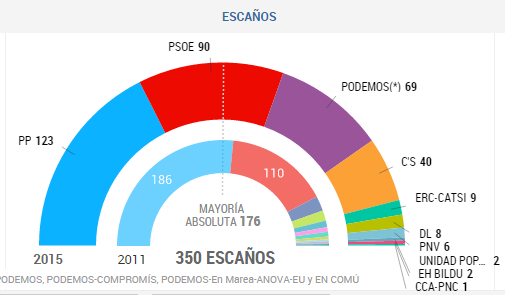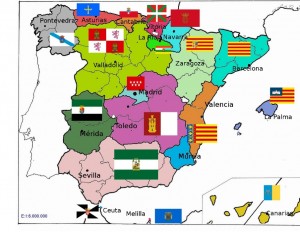¡Hola a todos!
Me han preguntado si pudiera escribir un poco sobre la política de España en el blog de este mes, a ver… ¿Dónde empiezo?
Las elecciones…
El 20 de diciembre de 2015 se celebraron las elecciones generales de España, y por primera vez en muchos años había más que dos partidos políticos principales. Los tres partidos que ganaron más votos eran el partido popular (PP) situado en el centro-derecha, gestionado por Mariano Rajoy – el expresidente de España. El Partido Socialista Obrero Español (PSOE) de centro-izquierdas dirigido por Pedro Sánchez y el nuevo partido Podemos de izquierdas encabezado por Pablo Iglesias.
Las elecciones de 2015 dieron el resultado más fragmentado de toda la historia de España, y los dos partidos más grandes (PP y PSOE – los equivalentes español de los partidos de Conservatives y Labour en el Reino Unido) perdieron su mayor número de votos desde la transición a la democracia entre los años setenta y ochenta.
El PP obtuvo la mayor número de votos pero no fue lo suficiente para lograr una mayoría absoluta, eso implica que el PP o cualquier de los otros partidos tienen que unirse para tener más de 176 escaños. El problema es que muchos de los partidos se niegan a colaborar entre ellos y hasta el día de hoy (9 de febrero de 2016) España sigue sin tener presidente. Por lo que ahora mismo la política española está en el aire. Si no se llega a una decisión pronto habrá que celebrar otras elecciones generales.
http://resultados.elpais.com/elecciones/generales.html Como podéis ver ningún partido tiene una mayoría absoluta así que siguen los debates.
Cada región disfruta de un cierto nivel de control sobre asuntos importantes tales como, financiación, el sistema sanitario, educación etc. Este sistema decentralizado hace que muchas comunidades sean!
En mi opinión cada una de estas Comunidades Autónomas tiene una increíble y distinta cultura. Me encanta la diversidad cultural que se pueda encontrar en España, y que puedes visitar una región y experimentar algo completamente diferente del peninsular. En cuanto a mi opinión sobre la política en España, voy a ser una verdadera miembro de parlamento y ¡no decir lo que cree en este blog!
¡Hasta la próxima vez!
ENGLISH TRANSLATION:
Hi everyone!
I’ve been asked to write a little bit about Spanish politics in this month’s blog update, so let me see where I can begin…
Elections…
So on 20th December 2015 the Spanish Government held their national elections, and for the first time in many years there were more than two main parties. The main three were the Partido Popular (PP) the mainly conservative party led by Spain’s last and current stand-in prime minister Mariano Rajoy. The Partido Socialista Obrero Español (PSOE) a centre-left led by Pedro Sanchez and the newcomer Podemos a left-wing party led by Pablo Iglesias.
The elections in 2015 gave the most fragmented result in Spanish history and the two biggest parties (PP and PSOE – Spain’s equivalent of the British Conservative and Labour Parties) lost the largest amount of votes respectively since the country’s transition to democracy in the late seventies/early eighties.
PP got the most votes but not enough to achieve an overall majority, so that means that PP or any of the other parties have to join together in order to form a majority. The problem is that many of the parties are unwilling to collaborate with each other and as of today (ninth Feb 2016) Spain still has no ruling party and no prime minister. So politics are currently a little bit in the air. If no decision is made soon there will have to be another General Election
http://resultados.elpais.com/elecciones/generales.html As you can see no party has an absolute majority so the discussions continue.
This situation is not helped by the fact that Spain is divided up into 17 Autonomous Communities.
Each autonomous community has a very degree of control over important issues such as finance, healthcare, education etc. This decentralised system makes several communities reluctant to rely on the powers in Madrid to provide the appropriate governance, and several regions have taken this further to wanting complete independence from Spain. Such as Catalonia, the Basque Country and Galicia.
In my opinion each and every one of these Autonomous Communities has a vastly different and amazing culture. I love the diversity that can be found in Spain and it’s nice to be able to visit and different area and gain a different flavour from this peninsular! As for my opinion on politics, I am going to be a true politician and refrain from stating what I believe on this blog!
Until next time!
Nikki


